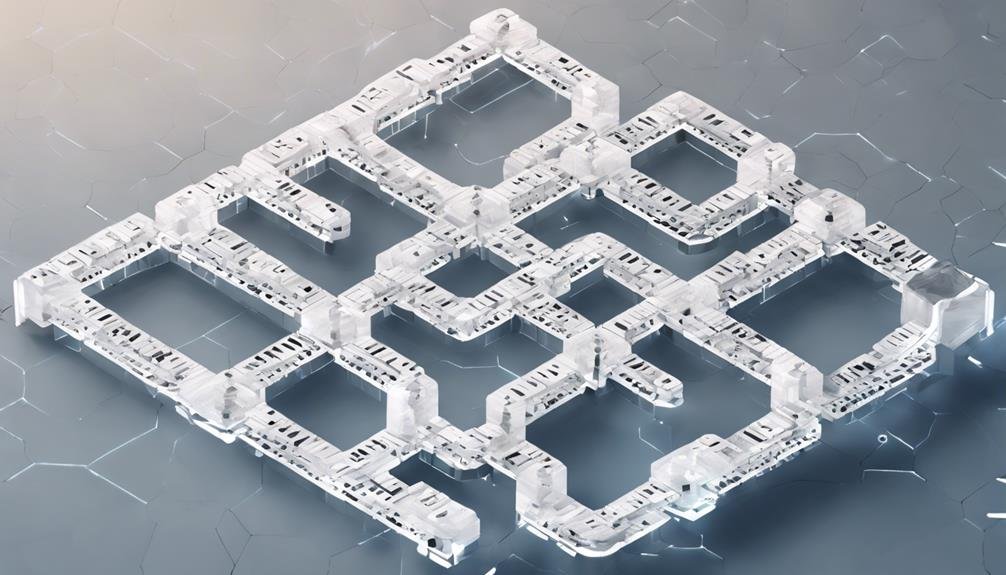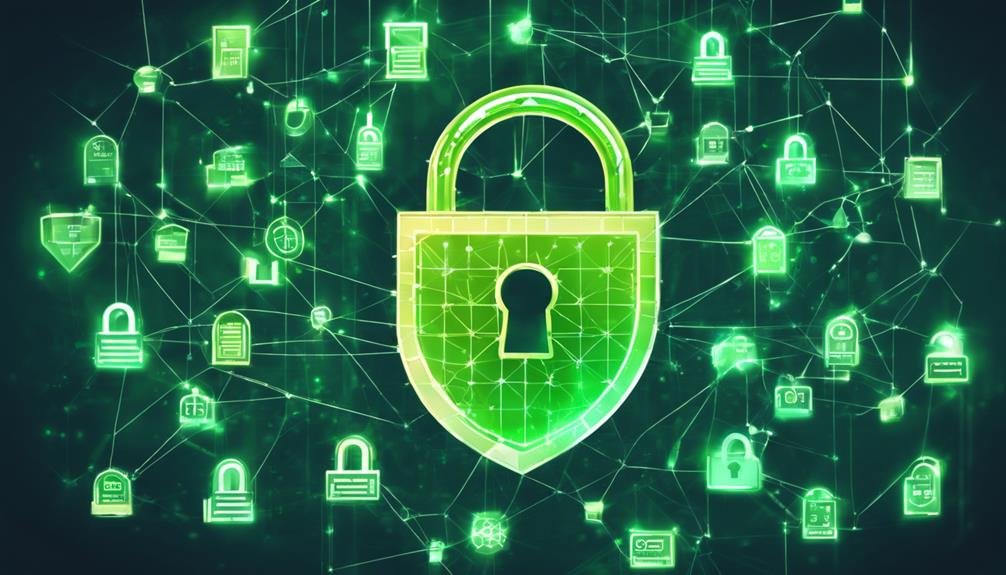Blockchain, the technology behind cryptocurrencies such as Bitcoin, transforms digital transactions by securely recording and verifying data through a decentralized network of interconnected blocks. Each block stores transaction information using cryptographic hashes, ensuring integrity and transparency.
Decentralized access enhances security, exploring how data is managed. Understanding blockchain as a digital ledger is critical to browsing the cryptocurrency landscape confidently, offering intricate insights into the future of digital transactions. Further insights await on the transformative potential of blockchain in various industries.
Brief Overview of Blockchain Technology Basics for Beginners
- Blockchain is a secure digital ledger for cryptocurrency transactions.
- Blocks in the blockchain are linked cryptographically for data integrity.
- Decentralized nodes enhance security and transparency in transactions.
- Each transaction is stored as a block, revolutionizing data handling.
- Understanding blockchain basics is crucial for navigating the cryptocurrency space confidently.
Understanding Blockchain Technology Basics
Understanding the fundamentals of blockchain technology is essential for successfully traversing the world of cryptocurrency. Blockchain serves as a digital ledger that securely records cryptocurrency transactions in a transparent and immutable manner. This technology consists of blocks linked chronologically using cryptographic hashes to guarantee data integrity. By facilitating decentralized access to information through nodes running blockchain software, blockchain enhances security and transparency in the digital landscape.
Each transaction or data piece is stored as a block, highlighting the significance of blockchain in revolutionizing data handling and transaction processes. Embracing the decentralized nature of blockchain technology is critical to safeguarding your digital assets and ensuring the integrity of your transactions. By understanding how blockchain operates as a digital ledger, you can confidently navigate the cryptocurrency space, knowing that your data is protected and your transactions are securely recorded.
Key Concepts of Cryptocurrency and Blockchain

Discover the fundamental concepts of cryptocurrency and blockchain to comprehend their significance in the digital landscape. Cryptocurrency operates on blockchain technology, a decentralized digital ledger that securely records transactions. This technology guarantees transparency by storing data in blocks linked chronologically using cryptographic hashes. The critical aspect of blockchain is immutability; once data is recorded in a block, it remains unalterable. By eliminating the need for transaction intermediaries, blockchain enhances efficiency and reduces costs.
Regarding cryptocurrency transactions on the blockchain, they are verified by network participants known as nodes, guaranteeing trust and security within the system. This decentralized approach fosters a sense of security and trust in the digital world. Understanding these key cryptocurrency and blockchain concepts is essential for grasping how Bitcoin and other digital assets operate securely and transparently.
Applications of Blockchain in Digital Assets

Regarding digital assets, blockchain technology ensures secure ownership and transactions. By leveraging blockchain, you can have a transparent and trustworthy system for managing your digital assets. Smart contracts powered by blockchain technology further streamline processes, ensuring smooth and efficient digital asset management.
Digital Asset Ownership
Blockchain technology revolutionizes the secure ownership and transfer of digital assets like cryptocurrencies. Your digital asset ownership is securely recorded on the blockchain ledger, ensuring transparency and protection against fraud. With blockchain, you can manage your digital assets through decentralized platforms, eliminating the need for intermediaries and enhancing security.
Whether storing crypto in digital wallets or trading tokenized assets and digital collectibles, blockchain provides a reliable way to securely track ownership and transfer digital assets. Embracing this technology allows you to have complete control over your digital assets, knowing that each transaction is securely recorded on the blockchain, providing you with peace of mind regarding the safety of your investments.
Secure Transactions With Blockchain
As you oversee your digital assets securely through blockchain technology, one vital aspect to ponder is the secure transactions facilitated by this innovative system.
- Blockchain technology guarantees tamper-proof and transparent transactions in digital assets like cryptocurrencies.
- It offers a decentralized ledger for tracking ownership and facilitating secure transfers.
- Blockchain enhances security, reduces fraud, and increases trust among users in digital asset transactions.
- By enabling efficient and immutable recording of transactions, blockchain in digital assets promotes transparency and reliability.
Advantages of Blockchain Technology

Blockchain technology provides numerous advantages, making it a valuable asset in the digital world. Blockchain security features guarantee that transactions are encrypted and secure, safeguarding sensitive information from malicious attacks.
Additionally, the transparency offered by blockchain technology allows for a transparent and immutable record of transactions, fostering trust and reliability in the system.
Security Features in Blockchain
With its advanced cryptographic encryption, blockchain technology fortifies data security and shields against unauthorized alterations, guaranteeing tamper-proof records and enhanced protection. When it comes to security features in blockchain technology, here are some key advantages to keep in mind:
- The decentralized nature of blockchain reduces the risk of centralized vulnerabilities.
- Private key authentication allows only authorized users to interact with the data securely.
- Permanent records with cryptographic signatures guarantee transparency and data integrity.
- Smart contracts enable secure and automated agreements, reducing the need for intermediaries and enhancing transaction efficiency.
Transparency Through Blockchain
How does blockchain technology revolutionize transparency in various industries? Blockchain guarantees transparency by storing transactions in tamper-proof blocks visible to all network participants. This decentralized approach eliminates intermediaries, reducing the risk of fraud and manipulation.
The immutable data on the blockchain creates a clear audit trail, simplifying the tracking and verification of transactions. By enhancing trust and accountability, blockchain technology fosters a more efficient and secure transaction process across industries.
This transparency benefits businesses and provides individuals with a safer way to engage in financial activities. Embracing blockchain can lead to a more trustworthy and reliable ecosystem where transactions are conducted with increased integrity and confidence.
Decentralization Benefits of Blockchain
Revolutionizing industries by fostering transparency and decentralization through blockchain technology offers many benefits that empower users and enhance security measures. Decentralization guarantees data integrity, transparency, and security through consensus mechanisms like proof of work or stake. Advantages of blockchain’s decentralization include reduced risk of a single point of failure, increased trust among users, and resistance to censorship.
Decentralized blockchain networks empower users with control over their data and transactions, promoting peer-to-peer interactions without intermediaries. The decentralized nature of blockchain technology fosters innovation, collaboration, and inclusivity in various industries by democratizing access to information and resources.
Exploring Careers in Blockchain Industry

Suppose you are considering a career in the blockchain industry. In that case, opportunities abound for individuals with the right qualifications and technical skills. A blockchain developer in the US earns an average annual base salary of approximately $136,000. In contrast, blockchain project managers can expect around $123,000. Qualifications for a career in blockchain typically include:
- Relevant experience.
- Degrees in computer science or related fields.
- A deep understanding of blockchain technology.
For those aiming to become blockchain architects, the average annual base salary is about $156,000 in the US. To excel in this industry, you need technical skills such as proficiency in computer science, cryptography, various programming languages, and understanding intelligent contracts. The blockchain industry offers a range of roles suited for different skill sets, making it an exciting field for those with a passion for technology and innovation.
Educational Pathways for Blockchain Careers

Considering a career in blockchain? You need the right educational background and skills to pursue a successful path in blockchain careers. Here are some tips to help you navigate the educational pathways for blockchain careers:
- Educational Requirements: Blockchain careers often require relevant experience or degrees in computer science, cryptography, or related fields.
- Technical Skills: Possessing an in-depth knowledge of blockchain technology and technical skills such as programming languages, smart contracts, and cryptography is essential for success in blockchain roles.
- Career Opportunities: Explore various roles in the blockchain industry, such as developer, legal consultant, project manager, quality engineer, and architect.
- Salary Variation: Remember that average annual base salaries for blockchain roles in the US can vary based on your specific career path.
Frequently Asked Questions
How Do You Explain Blockchain to Beginners?
When explaining blockchain to beginners, focus on basic concepts. Break down jargon and simplify complexities. Offer a beginner’s perspective with clear explanations. Provide a step-by-step guide to understanding the technology.
Share foundational knowledge with practical examples and real-world applications to make it relatable. This approach helps beginners grasp the significance of blockchain in revolutionizing data handling and transaction processes.
What Is Blockchain in Cryptocurrency in Simple Words?
Blockchain technology, the backbone of cryptocurrency, uses a decentralized system to create a secure digital ledger. Transactions are recorded in blocks and linked through encryption, ensuring transparency and immutability.
This peer-to-peer network offers secure transactions with smart contracts and transparent records. Understanding blockchain basics is essential for grasping the workings of cryptocurrencies like Bitcoin and Ethereum. This technology provides a trustworthy foundation for digital transactions.
What Is Cryptocurrency and Blockchain for Dummies?
Cryptocurrency is a digital currency that operates independently of traditional banking systems. It allows for secure global transactions using cryptography.
Blockchain, the technology behind cryptocurrencies, is a decentralized ledger for transparent and secure record-keeping. Understanding these basic concepts is essential for exploring the world of digital currency. Embrace the beginner’s guide to cryptocurrency and blockchain to grasp their decentralized nature and the fundamentals of this complex yet fascinating technology.
What Is Blockchain in Simplest Terms?
In simplest terms, blockchain is a digital ledger that securely records transactions in chronological order. It uses cryptographic hashes to link data blocks, ensuring transparency and security. Key features include immutability and decentralization, eliminating the need for intermediaries. Benefits include enhanced trust, reduced costs, and faster transactions. Practical applications range from finance to supply chain management. Risks include security vulnerabilities.
Understanding transactions involves tracking data changes. Blockchain’s security lies in its decentralized network and smart contracts. Future trends point towards broader adoption and innovation.
Final Thoughts
To summarize, blockchain technology is a ground-breaking concept that has the potential to revolutionize various industries, such as finance, healthcare, and supply chain management. By offering a secure and transparent method to record transactions, blockchain presents numerous advantages and possibilities for individuals interested in entering the field.
As the need for blockchain professionals continues to rise, exploring careers in this industry and pursuing educational pathways in blockchain can lead to promising and fulfilling opportunities in the future.










